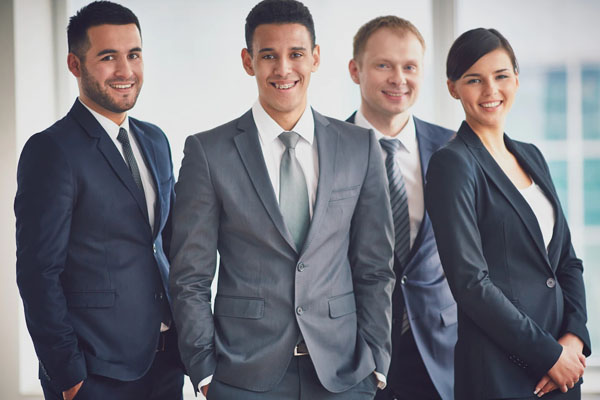
If business leaders take good care of their employees, they will most likely return the favor by performing at their best. This healthy reciprocation leads to a rewarding company culture and significant business growth. In this conversation with Justin Carrol of P1 Service Group, he discusses the importance of looking after your team even beyond the workplace. He talks about the power of bringing a sense of belongingness to your team, giving them a chance to voice their concerns and be more comfortable with their everyday tasks. Justin also shares how they hired a personal finance coach, a dietician, and a life coach to serve their employees, giving everyone additional knowledge and improving staff retention as well.
—
Steward Your Business To Growth With Justin Carrol
Every once in a while, there’s someone that you meet. In those first couple of minutes of talking, you know that it’s going to be a great conversation. Our guest is that for me. We see so much the same when it comes to how you grow a team and how you take care of a team. Our guest built amazing home services contracting business with 250 employees. It wasn’t just because he lucked into it or tripped over it. He had to do some personal searching and understand what it was that his team members wanted.
In this episode, we are going to share some of the things that he learned as well as some action items that you can put into place right away so that you can start seeing some of these same great benefits. As I think about what it is that we discuss, there’s so much here that not only will help you on the retention side and growing a team but it’s going to help you in your recruiting as well. I would love to introduce our guest, Justin Carrol, of the P1 Service Group. They’re doing some great things over there at P1 Service Group. One of the things that we’re doing is getting out there how important culture is to your business. Justin, welcome to the show.
Thank you.
We got to spend a little bit of time talking before we started. You’ve got a great story. I love what you’re doing in consolidating some brands and being able to provide resources to contractors that are out there that are thinking, “Are there other ways to do this? Are there other ways to be part of a larger group and get more support?” After that, we started talking a little bit about culture.
You and I couldn’t agree more on the importance of culture, but one of the things you brought up was you mentioned that there’s a reason that not a lot of people put a lot of value into culture in the trades. I would love for you to touch on that again for our readers because I thought the way you said it was so great and maybe help some people go, “That is an important thing.” Can you touch on that again for me?
In general, most of the people in the trades were trained by someone else in the trades. If that is the case, as a business owner, there’s nobody who comes knocking on your door one day that says, “Your culture here sucks. You need to do something about that.” If nobody brings it to our attention, we’re going to do things in a similar way to how we were taught.
Most people in the trades are being taught by another tradesman. The standard has been similar to joining a fraternity where you’re hazed for the first several months or several years of your career until you finally learn enough to where you’re worthy. You can go out on your own, and you’re not reliant on this expert from the industry who taught you how to use your tools. Ignorant ways of doing things being taught to the next person are how we ended up where we are now.
I still see that to this day. A new person shows up. The company can’t figure out why people are turning so fast, “They were here for three days. They were here for a week. They were here for two weeks.” The reality is it takes ten weeks for someone to find a new job on average. If they leave in the first ten weeks, they never stop looking. There were red flags the whole way.
We had a client one time. They did a lot of work. There was a lot of digging involved. They would grab a guy who’s brand new to the industry and has never been in construction before, put a shovel in his hands, and make him dig for eight hours a day. The next day, he couldn’t get out of bed because his body hurt like crazy. The belief was, “We dig ditches eight hours a day. They should be able to dig ditches eight hours a day.” I was like, “It doesn’t work like that day one.”
An important part is to be able to put yourself in the shoes of the new recruit or the new employee and say, “How do we build something stickier, better, and gets people excited?” You’re passionate about company culture. I’m going to throw it out there. What we’re talking about is how you behave inside your organization. What have you seen are some of the things that companies have done that have opened their eyes to this and changed the way they do it? Do you have any tips for our readers?
It all starts at the very top. It starts with the owners or the presidents of the companies. It starts with their mindset, “How do I think about the people who work for me?” In my company, I hated the word employee. I don’t use that word too often but I hated that word. I cringed when somebody called someone who worked here an employee. We changed that to team members.
The way that you think about the people who work within the company will drastically impact how they feel treated within the company. When people feel cared for and they truly feel like the company and the people that work within the company care about their well-being and are significantly concerned about that, they tend to reciprocate.
That’s not to say you don’t have some bad apples out there. If you take great care of them, they won’t take advantage of you, but in my opinion and my experience, when you go way out of your way to care about people, they will reciprocate 98% of the time with the exception of a couple of bad apples who won’t ever reciprocate. Maybe they don’t care.

It’s interesting you say that. In my new book that’s coming out, we talk about this care gap and the people that don’t care. They’re in that middle spot. They’re either a little toxic or they just don’t care. What can we do to help them? How do we solve that problem? What I found is that it’s better hiring decisions. It’s weeding those people out before they’re on the team because those people that don’t care about the situation drag everybody down.
I love what you said. People want to feel like they have a place where they belong. They want to feel like they’re cared for. It’s so counterintuitive to what I see in the trades, “We’re tough. We’re macho. We don’t need to worry about that soft fuzzy stuff.” I had guys tell me that before, “I don’t want to worry about this warm fuzzy stuff. That’s not for us.” At the end of the day, we’re all people. We all have those needs.
How loyal do we feel to someone who we don’t think has our best interest in mind? How loyal are we going to be to a person who we don’t believe cares about us?
You said, “People learn the trades by someone else in the trades.” They had this hazing mentality because that’s what they were taught. They did what they were taught. I don’t know if anyone has ever sat down and said, “Maybe we need to have conversations with people, understand what their hopes, goals, and dreams are, and what’s important to them, create that for them, and give them those opportunities.” We might not be in the predicament that we’re in where people aren’t joining the trades as they used to.
Everything we’re going to talk about I would imagine for the most part is mostly all common sense. Unfortunately, common sense isn’t common practice. If you were to sit down and say, “Forget about everything I’ve ever known about the trades,” let me consider what Justin said. He said that people want to be cared for and feel like they’re cared for. As long as they do, they’re likely going to be tremendously loyal to the business and be willing to run through mountains for it versus if we treat them like crap. When they don’t feel cared for, they’re probably going to be looking for opportunities to run every chance that they get. You’re a human. Does that seem logical? It’s common sense. It’s not rocket science.
You had 200 employees. That’s how big you built your company.
I believe at our peak, we have had 250, give or take.
You did something right. There are people right now thinking, “There’s no one out there that wants to work. There’s no way I can hire more people.” You found 250 people that work with you. There were some lessons learned in there, I would imagine. Can you share a couple of the things that we should be doing to help us not only grow a team but keep people too? Retention is a tough one as well. What were some lessons you learned in growing an organization that big?
There was a time when we were a revolving door. People came in as fast as they went out. We couldn’t retain people. It was also extremely difficult to hire people and get them to show up for their first day of work. What I mentioned earlier is where it all begins. It begins with the owners’ or the presidents’ mentality on people and team members, and how they should be treated.
Since we have already talked about that a little bit, we won’t spend much time there other than to say it starts with your mentality. If your mentality isn’t right and you’re trying to fake it, it will be seen. It will come out. This is something that you need to own. You need to truly care about the people who devote a large percentage of their waking hours in a day to you. You need to care about them and their well-being and how good of a life they’re living.
We can play a role in people’s well-being. I believe that we can enhance their lives. Once I started to think that way and got out of the selfish mentality that I was in, all of a sudden, I started to see different behaviors in people. To be honest, it started with my faith. It started with a connection with God and caring about what God would want me to do and how God would want me to steward over a business.

That’s when I realized I had a lot of selfish tendencies, but after recognizing that the right thing to do was to care about people first, and then start to implement and put things into place, that’s when everything started to shift. One day at a time, as I started to shift my mentality, I watched others around me start to grow, listen more, and be more engaged. Turn this into action items because that’s what you’re asking for. That’s what’s important.
That’s exactly where I was going to go. Thank you for that. What are some things they can do?
You should do something that aligns with you and your culture, and what you think matters to your team. I can explain what that was, but if the things that I say don’t resonate with you, then find your way. Find something that makes sense to you. I sat down and went through an exercise of what are the most important areas in a human being’s life. What are the most important things? I thought, “Money, relationships, and health are important to a lot of human beings. Within those categories, what benefits could I bring to my team that would allow them to exceed in those areas or grow in those areas of life?”
You could take money as an example. As crazy as it sounds, most of us were never taught to manage our budget. We’re never taught to create a budget at home. What could we do to help our team members to better understand budgeting and money and how to manage their money? We offered the benefit of the Dave Ramsey personal finance coaching that we paid for love. That was the first benefit we brought in. That’s where it all began. We paid for this Dave Ramsey coaching and experience for all of our team members.
We started with money, and then took a look at the health side of things. What could we do to improve the health of the people who work at Perfect Home Services? We started paying for gym memberships and dieticians. As a team member at our company, as long as you go to the gym at least eight times in a month and you bring in your proof that you went at least eight times in the month, two times a week, we would pay up to $20 for your gym membership. We would give you $20 for the month to pay for your gym membership, which we will usually pay for just about any gym out there. In most of the good gyms, that’s your entire membership cost.
We brought in this personal trainer and dietician who will do monthly meetings for everyone on the team or anyone who may want to join and listen, and then also does one-on-ones with them. We pay 100% for the dietician monthly meetings, and then pay for half of the one-on-one sessions that they do. I mentioned relationships earlier. Relationships are probably the most important thing that we have on this entire planet. More important than money and even our health is our relationships.
Relationships are the most important thing on this planet, way more than money or even health. Click To TweetI could spend a long time telling you why I believe that to be true but unless you ask, I’ll spare you those details. If you agree that it’s important, you would say that we all could probably be better at managing our relationships. We hired a life coach. We pay for a life coach for anybody at the company who wants to speak to a life coach. We have two. The one that we hired focuses on relationships more than anything else. Those are a few of the many benefits we have added to our team to try to enhance their lives in the areas that we feel are probably the most important to most human beings.
That’s great. Personal finances, your health, and then even your mental health are big issues now in construction and the trades. It’s having that life coach and being able to support that. We have seen some companies that will bring the spouses too in some of this stuff and help them. What I’ve learned is that if I can make the home life a little bit better for my team members, they’re going to reciprocate and bring that back to the office.
I love all of the examples you gave. A real differentiator for you too when you’re recruiting people as well is to say, “We aren’t just going to teach you how to turn a wrench and do the job. We’re going to give you some extra life skills and help you out personally so you can achieve your personal goals.” That’s a huge differentiator that you could use in your recruiting to help you grow that team as well. That’s fantastic. I’m listening to you talk about this stuff. As you said, it’s common sense and sounds so simple. Justin, tell me. Why don’t people do it?
Common sense isn’t always common practice. We fall into these habits unless someone brings it to our attention and unless we’ve got a good coach, a mentor or someone, especially as business owners. Often, most business owners don’t have a coach. They don’t have someone who looks over their shoulder and says, “Did you notice you’re doing that wrong?” That’s part of the problem too. If they do, does that person even understand what we’re talking about?

I do think it’s important that all business owners have a coach, and that they’re asking that coach to evaluate what they’re doing on a regular basis, and give them brutally honest feedback. That’s probably why a lot of us miss it. We’re doing it the way that we have observed others doing it. There’s nobody to come in and show us how we’re doing it wrong or to tell us otherwise, especially as an owner.
I can picture some people thinking, “Those are great ideas but my team is not going to care about that stuff.” I can picture them having that internal dialogue, “My team is not going to care.” I love what you said. It starts at the top. It starts with the leader making this mindset shift. What are 1 or 2 tips or action items you can give us to help make that mental shift from “I don’t need to do this” to “I need to do something.” You gave us some great items to do. How do I get over that mental gap? You mentioned the ignorance, “I did it that way because that’s the way I was taught.” How do we make that mental shift? What are some tips you have for our readers on that?
I do believe that every business should have a mission, vision, guiding principles, and core values. Those documents should have some language in there that speaks to some of this. You want to take it to a significant level. You want to take this seriously. Create a culture document, and within there, describe the culture that your organization is going to have. It could say, “I define the culture at ABC Heating and Air Conditioning as this. We do. We are.”
Use strong language like that and define what your culture will be. In doing so, think deeply about the human beings that work within the business, and how this business is going to serve them. If you think about serving them first, everything else ends up working out. A lot of businesses put too much emphasis on the client and not enough on their team.
What I’ve learned is if you focus on the client first rather than focusing on your team first, you will never be able to serve your client as well as you could have had you focused on your team first. At the end of the day, no matter how much the person at the helm cares about the client, it’s the team that’s probably there serving them every day.
Focus on your team first before your clients. No matter how much the person at the helm cares about their customers, it is the team that serves them everyday. Click To TweetIf you want your team to serve them at an exceptional level, then the team has to care at an exceptional level. The only way they’re going to care at that level is if they feel cared for first. It’s a myth or a backward thing to focus on clients first. We focus on our team members first. As a result, they’re going to love our clients the way we have loved them.
You are speaking my language. I love it. We did not rehearse this. Thank you, Justin, for that. That was fantastic. I have an example that I explain to people exactly what you’re talking about. We have all heard of customer experience, but most people I talked to have never heard of employee experience. It’s exactly what you’re talking about. If you focus on your employees’ experience, they will take amazing care of your customers, but the inverse isn’t true.
That’s another great action item. We were talking about action items. Evaluate your team members’ experience. Write that down and make some notes. What’s it like? Imagine that person you hired today and what that person is going to go through. In a typical company, when you think about what that looks like, it’s pretty sad. They don’t feel very welcome at all.
Oftentimes, it’s like, “You’re going to be riding with Joe today. He’s a little bit late. Go ahead and sit over there in the corner. He will pick you up as soon as he gets here. You will ride together for the next couple of weeks. Hopefully, it works out.” That person goes and hops in with Joe. This is an annoyance to Joe. Joe didn’t want to do this today. He doesn’t want someone riding around with him in his truck.
That’s their experience. I’m sure they’re feeling cared for now. Ask yourself, “How do I redefine this thing in such a way where at every turn, especially in the beginning, this new team member who’s looking very closely and evaluating whether they made the right decision or not in their very first week is like, ‘This has been fantastic. I feel cared for. I feel like an important member of this team.'” We have the ability to create either one of those experiences but we have to be intentional about it.

That brings me back to that story you started with about hazing. That’s not the great experience that people want. They want to know that you’re going to be there to take care of them and help them achieve their personal goals. Most people don’t work because they just want to work. They work because they want to take care of their family, pay rent, buy a car or take a trip. They have personal reasons for working. We are there to help them with that. The more we can engage them and make them feel like they belong, the better. It’s great.
You said that there are probably some people who may be saying, “That’s not my team. My team doesn’t operate that way. They don’t think that way. They wouldn’t appreciate all this fluffy stuff you’re talking about.” I would ask, “Do you have human beings on your team or do you have some other kind of being on your team? What do you have there?” If it’s a human being, our brains are all pretty darn similar in terms of the way that we’re wired. We all have different interests and whatnot, but there aren’t many human beings who don’t want to feel cared for.
Here’s another common sense thing here. How many human beings do you know that would say, “I don’t care if I’m cared for. That’s not important to me. It doesn’t matter.” At the end of the day, we all want to feel cared for and care about. Suicide is a terrible thing. What’s the primary reason for that? People don’t feel cared for. They don’t feel like there’s anyone on this planet who cares about them. If you’ve got a team of human beings on it, I can guarantee you, they would prefer to be cared for. If they’re not cared for today, they deserve to be cared for. They want to be cared for. You would see a different version of those humans if you put a little bit more care into them.
You’re not saying that we just have to sing Kumbaya all day and do that. We have to show them that they’re valued and that we care about what’s important to them.
It’s the small things that make a huge difference. You don’t even have to spend money. You don’t have to give benefits. It could be simply saying, “Bob, I remember when we spoke last week. You said your grandma was going to the hospital. How is she doing?” “He remembered, cared, asked, and checked in. He must care about me. I like that. That feels good to be cared about.”
It’s those small simple things, caring about people. If you made a list of all the things that you could do to make someone feel cared for, do those things every day. If you’re doing that from the helm of the company, people will tend to watch and repeat your behavior. It does start at the top. It has to begin with the owners and the presidents.
You have to want to do something different. You have to want this. That’s a disclaimer. Do not fake this. They will see through it. They will know that your motivations are not genuine. I love what you said too, “He remembered.” You have to create opportunities to have those conversations in the first place. If you don’t, they’re not going to share anything with you. This is something I’ve seen. You’ve probably seen this too. If you haven’t operated this way for the last decade, and all of a sudden you go, “I’m going to do this. Justin said this is what I have to do to start it,” it’s going to feel weird. Your team is going to look at you weirdly. They’re like, “What’s going on?”
They would be like, “Are you dying or something? What’s going on here?”
It’s being intentional and consistent. Eventually, they will open up to it.
Here’s another action item. Where does this caring conversation begin or live on a regular basis within a company? It is my belief that in every company on this planet, we should be doing one-on-ones with every single team member every single week. Whoever they directly report to, they should have a one-on-one with that person. That person should be trained on how to do a proper one-on-one. In my opinion, the most important thing that happens in a one-on-one is care. That’s where it begins. If that’s all we accomplish on this one-on-one, I’m perfectly okay with that.
If we don’t get into any conversations about their work performance, what’s going well, and what they’re struggling with in the work world, I’m perfectly okay with that. That’s secondary to, “How are you?” I don’t mean that in the way that we say it when we’re passing down the hallway, “How are you?” “I’m all right. See you later.” I mean it truly, “How are you doing?” As a human being, I’m interested in knowing how you’re doing. If you’ve never done that before, people might think it’s a little bit weird, but that is the most important question in the one-on-one.
Every company should be doing one-on-one meetings with every member of their team. These conversations must focus more on care instead of work performance. Click To TweetIn the beginning, if you don’t do this often, you may have to question a little bit deeper, “Is everything going great at home? Is everything going great for you here at work? Is there anything that’s bringing you stress? What has your experience been like here? Do you love it here? What could we do to make you love it here?” They’re questions to understand how they’re doing and what they’re feeling. In the event something isn’t so good, here’s another action item, take action on whatever it is that may be off in the relationship or at home. Is there a way that you could possibly help this human who is not having the best time right now? Take action on that.
We had a client years ago. All of a sudden, performance plummeted. They didn’t know what was going on. We used behavioral assessments in some of the work that we do. They ran the assessment. It said something was out of whack. They sat down to have a conversation with him. He starts crying right in front of him. He was going through a nasty divorce. He didn’t want to let work know because he didn’t want them to judge or whatever was going through his mind. He thought he was doing a good job of not letting it show up at work but it did not go well.
They sat down and said, “How can we support you?” He says, “One of the biggest things for me is if I need to go to a meeting with my attorney, to court, or something like that to deal with this stuff, I would like to know that you’re flexible with my schedule. That would be a huge weight off my shoulder. I’ll still have a job but you will let me deal with my stuff that’s going on personally.” They’re like, “Within reason, we can help and accommodate as long as you know a couple of days in advance so we don’t put you on the schedule.” All of a sudden, his performance went back because he knew he was cared for.
Maybe he gets better than ever before as a result of the loyalty that’s felt now for this company that had his back.
There are so many opportunities. We could keep going. I feel like we’re hitting on a roll here with some of these great action items. Justin, thank you so much. They’re great. What it comes down to though is making that decision that you want to do this differently. You want to connect and let people know that you care. Action step number one is making that mental decision to do this. This was so great. If people want to learn more about you or they want to be able to connect with you and maybe even pick your brain a little bit more, how do people get ahold of you? How do they find you?
Email is probably the best for me. My email address is [email protected].
That’s awesome. I know that you’re still growing the P1 Service Group. If anybody wants to be part of a larger group, maybe there are even some opportunities to have that conversation. They could learn firsthand from you how to do this, which would be incredible. Justin, thank you so much for being on here. This is a topic that is near and dear to my heart. As soon as you started talking about vision, values, and all that other stuff, I was loving it. Thank you so much. There are some great practical tips for someone who has built a very large successful team. Thank you so much for being on the show.
Thank you for having me. It has been an honor.
Mentioned in this episode:
Love the show? Subscribe, rate, review, and share! https://bluecollarculture.com/podcast/
